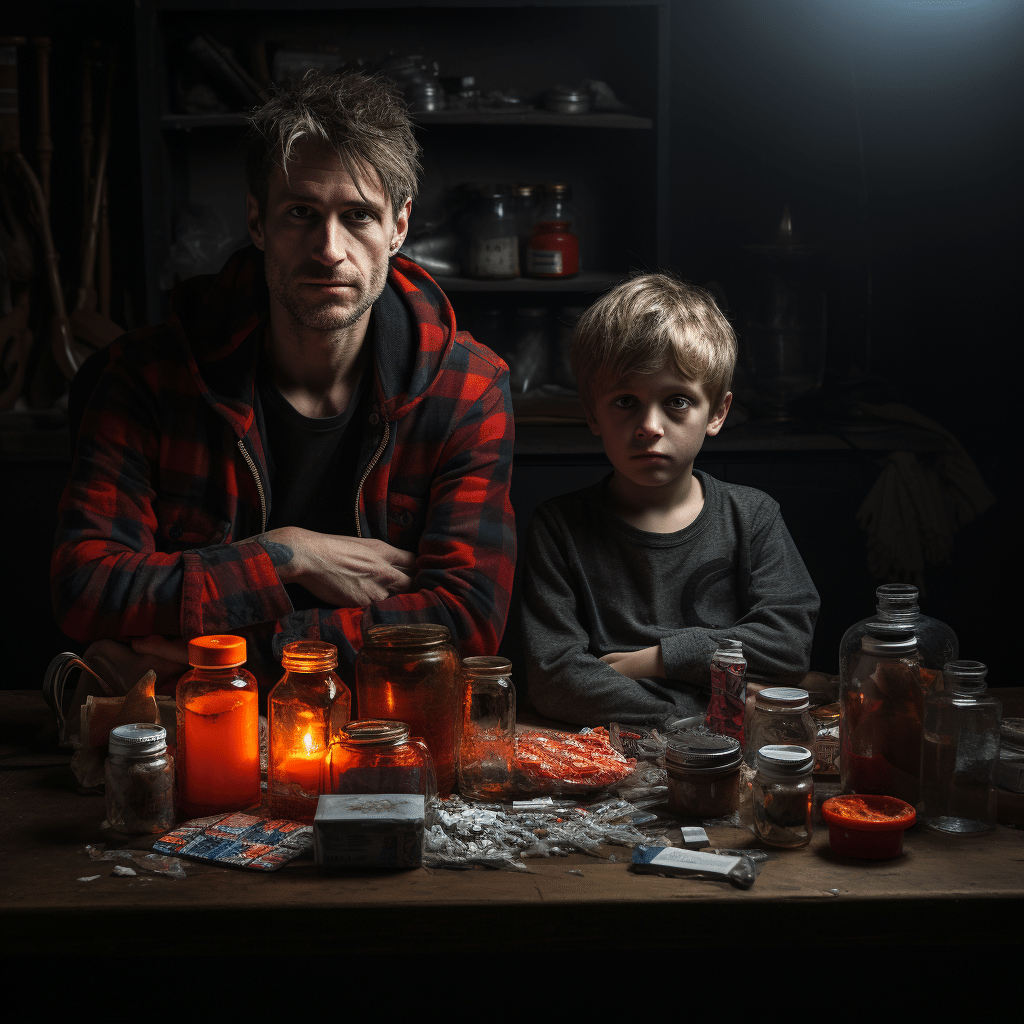Understanding Addiction: A Primer for Parents
Addiction isn’t just a series of bad choices; it’s a chronic disease, one that twists the mind into prioritizing drugs over everything else. It’s crucial for us to shatter the common misconceptions about drug addiction, to understand that this condition often stems from factors beyond a person’s control. As parents, our empathy and education on the topic are the first steps in dealing with addiction. Just like we’d rally to learn about any illness affecting our child, tackling addiction with the same fervor is no different.
When we view addiction through a lens of empathy, we stop asking “how can I fix my drug addicted son?” and start wondering “how can I help my drug addicted son heal and connect?” This shift in perspective is what puts us on the right path.
Recognizing the Signs: Is Your Son Struggling with Addiction?
It’s a parent’s nightmare: the suspicion that their child may be caught in the grip of addiction. If you’ve noticed behavior changes, money disappearing, or a sudden drop in performance or interests, it’s time to look closer. How do I help my drug addicted son, you may ask, if I’m not even sure there’s a problem? Well, the signs may be elusive at first, a gradual shift that sneaks up on you both.
Denial is an understandable reaction, but it’s important to remember that when suspicion needs to turn into action, delay can be dangerous. Here are some signs to watch for, but remember, trust your gut—you know your child better than anyone else.

| Action | Description | Considerations | Potential Outcomes | Resources (Examples) |
| Seek Professional Help | Engage with addiction counselors, therapists, or rehab facilities to get expert support. | Find professionals experienced with youth and drug addiction. | Professional guidance tailored to your son’s needs. | SAMHSA’s National Helpline, local rehab centers |
| Inform Yourself | Learn about addiction including its psychological and physical effects. | Use reliable resources to get accurate information. | Empower yourself with the knowledge to assist your son. | National Institute on Drug Abuse (NIDA) |
| Communicate | Maintain open, non-judgmental, and honest communication with your son. | Avoid confrontations, use active listening. | Strengthen the trust and relationship with your son. | Family therapy sessions |
| Set Boundaries | Establish clear rules and consequences within the household. | Boundaries must be reasonable and enforceable. | Creates a structured and predictable environment. | Guidance from family counselors |
| Family Support | Engage the whole family in support and recovery efforts. | Include siblings and involve everyone in therapy if possible. | Family unity can provide a stronger support network. | Al-Anon, Nar-Anon family groups |
| Encourage Healthy Activities | Encourage participation in sports, hobbies, or volunteer work to establish routine and purpose. | Must be of interest to your son. | Replace drug use with positive activities and accomplishments. | Community centers, local sports clubs |
| Build a Support Network | Cultivate a network of friends, relatives, and support groups that encourage sobriety. | Avoid contacts that enable addiction. | Social reinforcement for recovery. | Support groups for families of addicts |
| Supervise Medications | If prescription drugs are involved, ensure they are securely managed and there’s accountability for their use. | Handle medications with caution and oversee usage. | Prevent misuse or relapse. | Lockboxes for medication storage, prescription monitoring |
| Plan for Relapses | Understand that relapse can be a part of the recovery journey and plan for how to address it. | Treat relapse as an opportunity for growth, not failure. | Quick intervention can prevent a full-blown return to addiction. | Relapse prevention programs, ongoing therapy |
| Take Care of Yourself | Ensure you’re taking care of your own health and well-being to be strong for your son. | Seek personal therapy or support to manage stress. | You cannot pour from an empty cup. | Personal therapist, self-care routines |
How Can I Help My Drug Addicted Son? Creating a Supportive Environment at Home
The support you offer should empower, not enable, your child’s addiction. This means finding a balance, which may well be the tightest tightrope you’ve ever walked. Creating a drug addict son living home scenario that promotes healing requires clarity about what is help and what is hindrance.
Communication is your most powerful tool here, but it must be steeped in compassion. Sometimes, just being heard can begin to bridge gaps that seemed impassable.
Navigating the Treatment Landscape: Options for Your Son
Finding the right treatment for your son might seem daunting, but thankfully, there are more avenues now than ever before. From residential programs to outpatient care, the most effective treatment is often one that speaks to the specific needs of your son. It’s also important to consider professional intervention, as sometimes the voice of an outsider can penetrate walls of resistance.
Evaluating treatment centers and programs is a critical step. Research and visits can help you ensure that the place you choose will nurture and challenge your son towards recovery.

Financial and Legal Considerations in Treatment
The journey of recovery often comes with hefty financial implications. That’s why understanding insurance and funding options for rehabilitation is key. It is possible to find help My son Is on Drugs without breaking the bank, but it requires due diligence and sometimes creativity in sourcing funds.
Navigating legal issues related to drug addiction can be equally complex. The legal ramifications of addiction vary widely, but knowledge and preparation can help you manage them more effectively.
The Role of Therapy and Counseling
Therapy can be a transformative experience, both for your son and for your family. While individual counseling focuses on his personal struggles, group therapy offers camaraderie and understanding from peers. But how do you find the right therapist or counselor? It often comes down to a blend of professional qualifications and personal rapport. Don’t be afraid to shop around until you find the right fit.
Engaging in Family Dynamics and Healing
Family involvement is not just beneficial in the recovery process—it’s often essential. Family therapy delves into the broader patterns and pain that may have contributed to addiction, and working on these issues is key for healing. It’s a brave space, where stigma and blame can finally be put to rest and transformation can begin.
How to Help a Drug Addict Son Without Losing Yourself
Learning how to stop worrying about drug addict son involves setting limits for yourself. It’s the art of caring without caretaking, of loving without losing your own bearings. Self-care means ensuring you’re not pouring from an empty cup because you’ll need all your strength in this journey. Additionally, support is out there—find it. Whether through groups or individual counseling, sharing your burden eases it.
The Long Road: Relapse, Recovery, and Reinforcement
A slip or a relapse can be heart-rending, but it’s not the end of the road. Reinforcing positive behaviors and celebrating milestones—however small—are monumental in bolstering your son’s recovery. Success looks different for everyone, and each step forward is a rebuke to the disease of addiction.
When to Take a Step Back: How to Let Go of a Drug Addict Son
Learning how to let go of a drug addict son isn’t an admission of defeat—it’s an act of love. There comes a point where you must protect your well-being and possibly that of others in your family. It’s letting go, not because you don’t care, but because you do.
Addressing Your Fears: What To Do With A Drug Addicted Son
Every parent’s situation is unique, yet the fears we face often echo each other. By facing these fears head-on, we can move from a place of paralysis to a position of empowerment. Action displaces worry, and maintaining hope is your secret weapon against the shadow of fear.
Decision Points: The Hardest Questions Answered
These are the cruxes where paths diverge, where decisive action feels weighty with consequence. Whether it’s choosing between home or residential care, balancing the scales of recovery progress, or even dealing with criminal behavior, the answers will often require deep reflection and consultation with professionals.
Moving Forward Together: Strengthening the Parent-Son Bond
Rebuilding trust takes time and patience, often more than we think we have. Yet, this labor can ultimately be rewarded with a bond stronger than before. Developing new traditions and fostering resilience will bolster not only your son’s independence but also the profound connection you share.
Embracing a New Normal
Recovery doesn’t have an endpoint; it’s a continuous journey. As parents, our role evolves as our children do, morphing as they grow more independent. It’s about looking forward with a blend of optimism and realism.
Nurturing Hope: Pathways to a Healthier Tomorrow
Join us at Mothers Against Addiction as we embrace the journey of recovery with our sons. Our chosen family of other mothers understands the unique challenges you face. Visit our Parents Of Addicts blog for shared experiences and wisdom, and remember that each step forward is a triumph. Together, we learn, we heal, and we grow stronger—step by hopeful step.





























